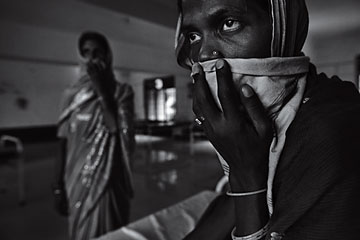
Patients in a TB isolation ward in impoverished Bihar state, which has one of India's highest infection rates
(3 of 3)
And that's exactly what most people in Bihar — and indeed most of India — do. Today there are about 57 doctors per 100,000 people, a number that the government says falls far short of what's needed. The vast and unwieldy sector of private practitioners ranges from qualified professionals to unskilled entrepreneurs who sniff an opportunity to siphon off customers from crowded and generally loathed government facilities. Even patients with almost no money prefer to drop into a private neighborhood clinic than wait in line for hours at a public hospital. Thus, untold numbers of hole-in-the-wall providers are often the first point of contact in India's battle against TB.
The government plans to make TB drugs free in the private as well as public sectors. If well implemented, the move could have an enormous impact on the spread of the disease and on drug resistance. If it's not done right, wider use of powerful second-line drugs in particular could make resistance worse. India has also made the reporting of TB mandatory and became the first nation in the world to ban the import and use of an inexpensive but dangerously inaccurate TB blood test. (Without an effective system to communicate or enforce the new regulations, however, the test is still being widely used.) "More than 60% [of TB patients] are getting treated in the private sector, and it is totally unregulated," says Khetarpal. Even in a major city like Mumbai, she admits, "regulating them is beyond our ability."
The Long Game
What happens in India could alter the course of one of the world's oldest and deadliest diseases, but India is not the only country in the fight. In Belarus, where some of the highest rates of MDR TB have been detected, public-health experts are trying to contain the disease among needle-drug users. In Russia and Britain, drug resistance is rampant in prisons. Studies in other countries, including India's neighbor Pakistan, show that getting the private sector involved is key to increasing the number of TB cases that get diagnosed — and therefore is key to containing the disease. "International policy has focused on the public sector," says Salmaan Keshavjee, a professor at Harvard University who studies TB. "That might work in Canada, but in most of the world, people buy care from the private sector ... If you don't engage with it, you're never going to get this disease under control."
WHO estimates that TB costs the global economy nearly $12 billion a year in lost productivity and wages due to sickness and death, with India and China making up half that sum. Last March, the Bill & Melinda Gates Foundation gave a $220 million grant to the U.S. nonprofit biotech firm Aeras to develop new vaccines. In the first major TB-vaccine trial in decades, an initially promising Aeras vaccine was found to be ineffective — a serious setback — but now about a dozen new vaccines are being tested in clinical trials, according to the Stop TB Partnership. In December the U.S. Food and Drug Administration approved the first new TB drug in decades, and several other drugs are also in the pipeline that could help fight resistant strains, be taken for shorter periods, decrease side effects and be more effective for HIV/AIDS patients. Faster and more accurate diagnostic tools are on the way, including GeneXpert, a machine already in use in India and other parts of the world that tests for drug-resistant TB in hours, not weeks.
For now, though, frontline staff are making do with the drugs they have. When TIME visited Udwadia's airy Mumbai office, he sat facing portraits of Dr. Robert Koch, the scientist who discovered the TB bacterium, and American jazz great Miles Davis. As desperate patients who weren't responding to drugs shuffled through his door, Udwadia appeared to take cues from the latter — by improvising treatments. Udwadia gestured to a longtime patient sitting at his desk. "At one stage, I told this man, 'Go away. We can't help you,'" he said. Owais Sheikh was one of the first patients Udwadia diagnosed as being TDR. He didn't think anything would help the young father of two, who also has HIV. It was only because of Sheikh's determination to get treated and eventually Udwadia's willingness to try an unproven combination of drugs that Sheikh remained alive. "I'm very happy, my friend," Udwadia said that day, looking at his smiling patient. "Totally drug-resistant does not mean totally doomed."
Or perhaps it does. Because Sheikh has since suffered a relapse and Udwadia has been forced to seek yet another untried course that could leave the bacterium stronger if they don't succeed in killing it. In the fight against TDR, hope and happy endings are tragically rare.
— with reporting by Shashikant Sawant / Mumbai
